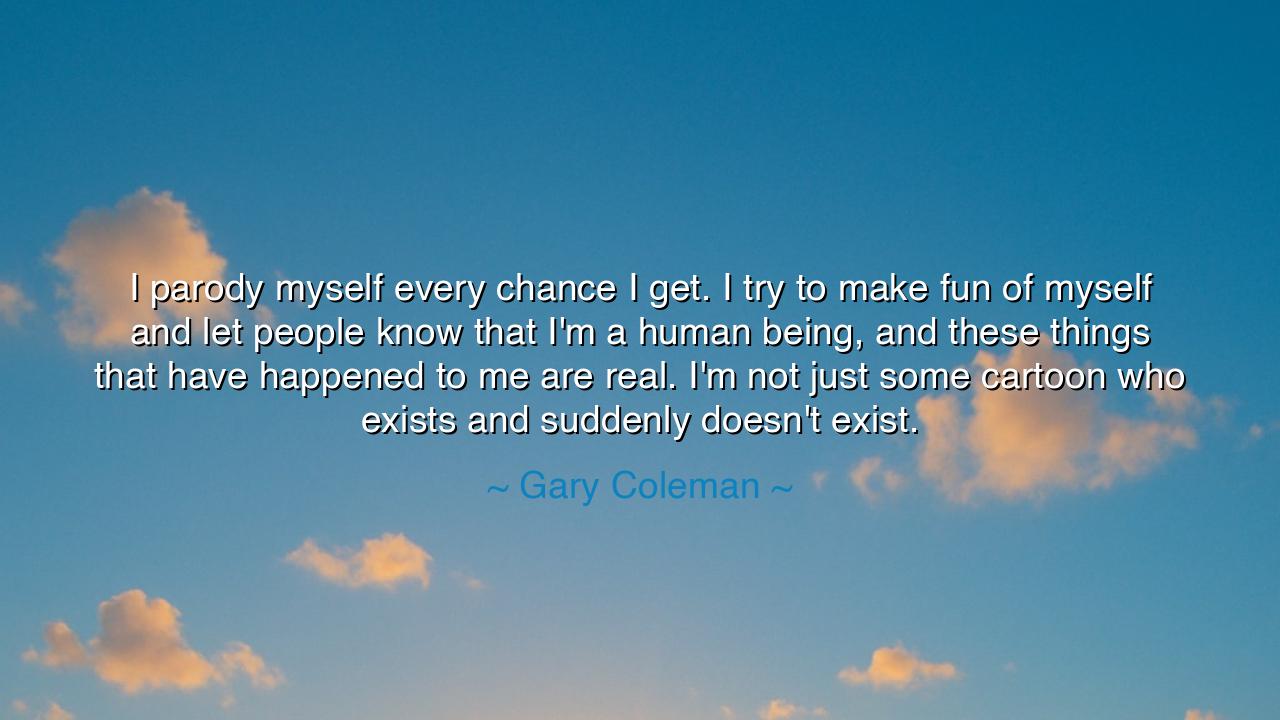
I parody myself every chance I get. I try to make fun of myself
I parody myself every chance I get. I try to make fun of myself and let people know that I'm a human being, and these things that have happened to me are real. I'm not just some cartoon who exists and suddenly doesn't exist.






In the grand theater of life, there are many roles we play. We are actors on a stage that is ever-changing, sometimes in the limelight, and sometimes lost in the shadows. Gary Coleman, a man whose early life and fame were both a gift and a burden, once remarked, "I parody myself every chance I get. I try to make fun of myself and let people know that I'm a human being, and these things that have happened to me are real. I'm not just some cartoon who exists and suddenly doesn't exist." In this simple but profound declaration, Coleman reveals a deep truth about the human experience: that we are not defined by our public persona or the roles we play in the eyes of others, but by our authenticity, our ability to embrace both our strengths and our flaws with equal measure.
In the age of ancient philosophers, the search for self-awareness and the balance between our inner selves and outward appearances was a constant theme. Socrates, the great philosopher, famously said, "Know thyself." To know oneself is to see beyond the external trappings, beyond the masks we wear in society, and to recognize the truth of who we are, with all of our complexities and contradictions. Gary Coleman’s parody of himself, his willingness to laugh at his own image, is a modern reflection of this timeless wisdom. It is a recognition that the self is not static, nor is it defined by the roles we play. Instead, it is shaped by the humility to acknowledge our imperfections and the courage to laugh at them, to make light of the very things that others may find difficult or uncomfortable.
Consider the great Shakespeare, whose characters often embraced the complexity of human nature with a blend of tragedy and comedy. Think of the character of Hamlet, who, in his search for truth, parodies himself and the world around him, all while carrying the weight of a kingdom’s expectations. Hamlet’s ability to mock the world he inhabits, while simultaneously seeking a deeper understanding of himself, is a reflection of the human condition. Shakespeare’s tragic hero was not just a prince or a scholar, but a man struggling with the roles he was expected to play. Similarly, Gary Coleman’s self-parody is an acknowledgment that we are all more than the persona others see; we are humans with flaws, triumphs, and a shared humanity that transcends the roles we perform.
There is a power in self-parody, for it allows us to own our story, to disarm the judgments of others. When Coleman pokes fun at his fame, at the very image the world held of him, he humanizes himself. He reminds others that, despite the external narratives they create for us, we are not cartoons or objects of entertainment to be consumed and discarded. Rather, we are beings with real experiences, emotions, and lives that extend beyond the fleeting moments of fame. This act of self-parody is an act of rebellion against the stereotypes and expectations that seek to confine us. Coleman's humor invites us to laugh at the absurdity of life itself, and to embrace our humanness with grace.
In the ancient world, the fool or jesters often played an important role, for they could speak truth when others could not. Through laughter and parody, they exposed the flaws of kings, of society, and of human nature itself. Aristophanes, the great comedic playwright of ancient Greece, used humor to examine the truth of political and social life. His comedies were filled with absurdities, but through those absurdities, he revealed the darker truths of the world. Similarly, Coleman's use of humor to parody himself serves as a tool to disarm the superficial judgments placed upon him and to expose the truth beneath the surface: he is not just a character on a screen, but a man with a rich and complex story. By laughing at himself, he invites us to do the same—to see ourselves not as the roles we play, but as the humans we truly are.
The lesson in Gary Coleman’s words is clear: in a world that often seeks to define us by our external labels, the greatest act of courage is to laugh at ourselves, to acknowledge that our imperfections are as much a part of us as our strengths. Self-parody is not a sign of weakness, but of strength, of wisdom. It is the understanding that we are all human beings, subject to the whims of fate, the pressures of society, and the weight of our own choices. By embracing our flaws and laughing at the roles we play, we can free ourselves from the expectations of others and live authentically.
So, as you walk the path of life, remember Gary Coleman’s wisdom. Parody yourself, not as an act of self-deprecation, but as a way to embrace your true self. Recognize that in every moment, you are not defined by the roles you play or the judgments of others, but by the authenticity and humility with which you engage with the world. Laugh at the absurdities of life, for in doing so, you will not only free yourself from the weight of expectation, but you will find the true freedom that comes from embracing your humanity.






AAdministratorAdministrator
Welcome, honored guests. Please leave a comment, we will respond soon